#
MARCH ARCHITECTURE

PEIYAO FENG
SELECTED WORK 2020-2022
PORTFOLIO
EDUCATION
2020Now
University of Edinburgh (UK)
BA Architecture ARP/RIBA I Distinction (predicted)
• Received First Class Honours on studio class (Architectural Design: Element / Architectural Design: Assembly)
• Four projects selected as excellent assignment representatives in the Edinburgh School of Architecture and Landscape Architecture Catalogue 2020-21and 2021-2022
20182020
Heritage Christian School (USA)
• Overall GPA 4.27
• Pass AP Calculus AB/ BC (5), Psychology (5), Physics (3)
AWARDS & PROFESSIONAL EXPERIENCES
2022Now
PEIYAO FENG
eurusyao@gmail.com
07824042448
2022
EDINA (Edinburgh, UK)
Intern: Digimap CAD service / ArcGIS Indoor Mapping Assistant
• Being a geography data handling assistant and offering help from an architecture perspective for Digimap feature development.
Scottish Ecological Design Association KJ Awards (Shortlist)
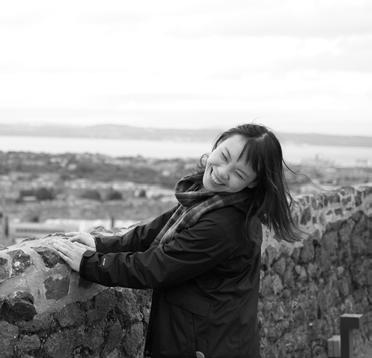
• My second-year Paris housing studio project has been nominated for SEDA KJ Award and I am one of the only four students who have been nominated by ESALA.
Atelier CnS (Guangzhou, China)
Summer Architect Apprenticeship
• Fully participated in the renovation project of a historical relic site, XiaHengDang island.
The University of Hong Kong (Hong Kong)
Summer School Course Career Discovery in Architecture
AMC 10 (American Math Completion 10 ) First Place
2
PROFILE
Spring 2021 Summer 2019 Summer 2018
'' ARCHITECTURE, A COMMUNAL ART, NOT PRODUCED BY A FEW INTELLECTUALS OR SPECIALISTS BUT BY THE SPONTANEOUS AND CONTINUING ACTIVITY OF WHOLE PEOPLE WITH A COMMON HERITAGE, ACTING UNDER A COMMUNITY OF EXPERIENCE. ''


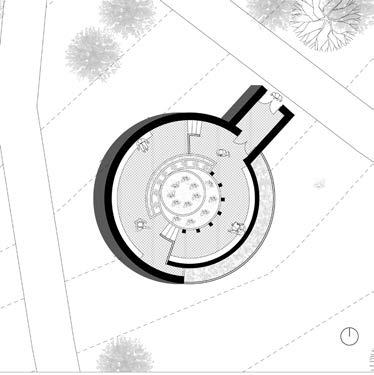
TABLE OF CONTENTS
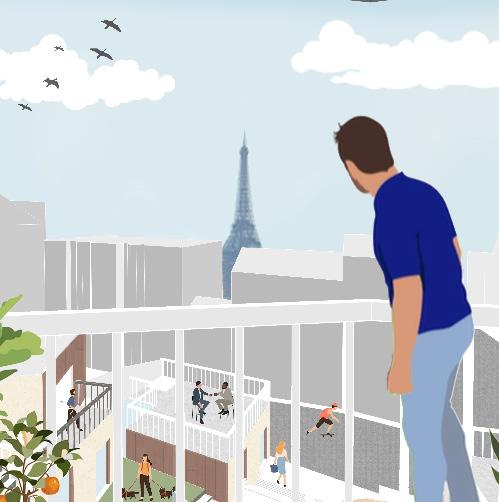
3 ART IN MOTION ARCHITECTURE OF SOCIAL SUSTAINABILITY/ COMMUNITY P3
ORCHID HOUSE ARCHITECTURE OF PUBLIC PERCEPTION/ SUSTAINABILITY P16 ARCADE KINDERGARTEN ARCHITECTURE OF CULTURAL INHERITANCE P10
THE LANDSCAPE ARCHITECTURE OF SYMBIOSIS P21 01 03 02 04
THERMAL
LINES IN
PIETRO BELLUSCHI
ART IN MOTION #
1 ARCHITECTURE OF SOCIAL SUSTAINABILITY/ COMMUNITY
Scottish Ecological Design Association KJ Awards (Shortlist)
Architectural Design: Any Place Course Work / Second Year
2022 Individual Work Location:Belleville, Paris

Supervisor: Andy Summers and Dr Nikolia-Sotiria Kartalou andy.summers@ed.ac.uk/ n.kartalou@ed.ac.uk
This assignment asks to develop a collective residential building on a typical site located in the artist gather neighbourhood, Belleville. It encourages us to propose novel forms of living, sharing or collectivising domestic life in a changing world and reconsider the duality of public and private.

4
Today, Belleville is a colourful, multiethnic neighbourhood with a lot of artist studios, restaurants, associations and stores. It is also famous for being a street art centre in Paris. However, the lack of innovative communicating, working and co-living spaces makes many artists feel isolated and hard to build strong relations with other colleagues.
GOAL
An apartment that allows them to live together, to share interests, to understander each other…

RESULT
NEEDED SPACES

SITE ANALYSIS/ CLIENT STUDIO SPACE RESTING
FRANCE PARIS
SHOP MEETING FAMILY SPACE WORKING SPACE OUTDOOR GARDEN EXIBITION
Rue Fernand Raynaud, 75020 Paris 48°52'16.1"N 2°23'29.7"E
ARTIST CONFIGURATION NEIGHBORHOOD CAREER
19TH ARRONDISSEMENT
5
RESEARCH STUDIES / DESIGN STRATEGY
PRECEDENT STUDY CASES AND THEORY KEY STRATEGIES KEY STRATEGIES ATTEMPT COMPOSITIONS
The Borderless Community of
Zi Ni Twelve Gates
Architect: FEI Architect


Location: Guangzhou, China
Interlocking living blocks, encountering promoting apartment layout







Skylight and various forms of windows create interesting visual connections
Netherlands Embassy
Architect: OMA



Location: Berlin, Germany
Internal zigzag path connected all space


Corridor

Moca House
Architect: ATELIER BOW-WOW

Location: Tokyo, Japan
The combination of internal and external circulation
Talk to each other on your own balcony
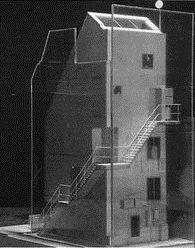
After well researching Paris's local context, residential precedents, and clients needs, a vertical village which integrates living, working, and art work presenting is the result.


Ten multiple-use units that served ten different artist and connected by a wander ramp which form a dynamic community. Those 10 Units are similar to a collections of diverse display cabinets that presenting each artist’s life.
Arcades Project (Book)
Author: Walter Benjamin
Huge windows mincing display cabinet to present artist life (understand each other better)

6
Showcasing artworks from the window
Site Plan Attempted potato massing model
or front garden combined with public circulation
Concept Sketch




7 FORM GENERATION & TEN UNITS
Many Semi -Public spaces or buffer zones are deliberatly create to allow both visual or physical connection maintain while protecting privacy.
Private Semi-Private Public
Penetrate floor slab to create vertical conncetions
Active inking platforms created
The wooden grating facade protects the client's privacy and offers some environmental shading
Boxes connect by the entwining paths creating a dynamic community
Connecting the upper and lower street
1 2 3 4 5 6 Aerial View Render
Ground Condition ( Height Different )
Upper Floor Plan
The wandering ramp connects unit one to ten which become a vertical street that bond the community together. Many windows, terraces or gardens are suitable to hold different activities and promote encountered to happen. Furthermore, the resident will able to see each others’ art work along with the way home.


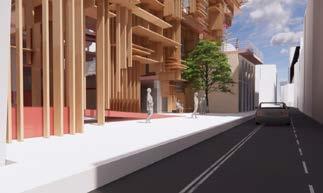
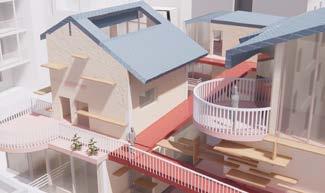



16. Housing
10 15.
9 14.
6
13.
7 12.
11.
10.
9.
3 8.
2 7.
1
6.
5.
4.
1
3.
2.
1.
1 3 4 6 8 10 16 11 12 14 15 13 9 7 5 2 Lower Ground Floor Lower Frist Floor Upper Ground Floor Upper Frist Floor Upper Fourth Floor Upper Second Floor Close-look Renders WANDERING
8
Showcase Studio Window
Unit
Housing Unit
Housing Unit
(2)
Housing Unit
Housing Unit 6 (1)
Housing Unit 4 (2)
Housing Unit 4 (1)
Housing Unit
Housing Unit
Housing Unit
(2)
Upper Gallery
Upper street Entrance Garden
Housing Unit
(1)
Lower Gallery
Conference room Lobby
Cafe
RAMP
Cafe, Studio, Shops, Bedroom, Living room, Kitchen, Study, Terrace, Balcony, Bathroom…

Artists’ daily life are all weaved together yet independent. But there are always chances that you can see your Neighbour painting, playing, cooking or just thinking. Every interaction can be their inspiration.
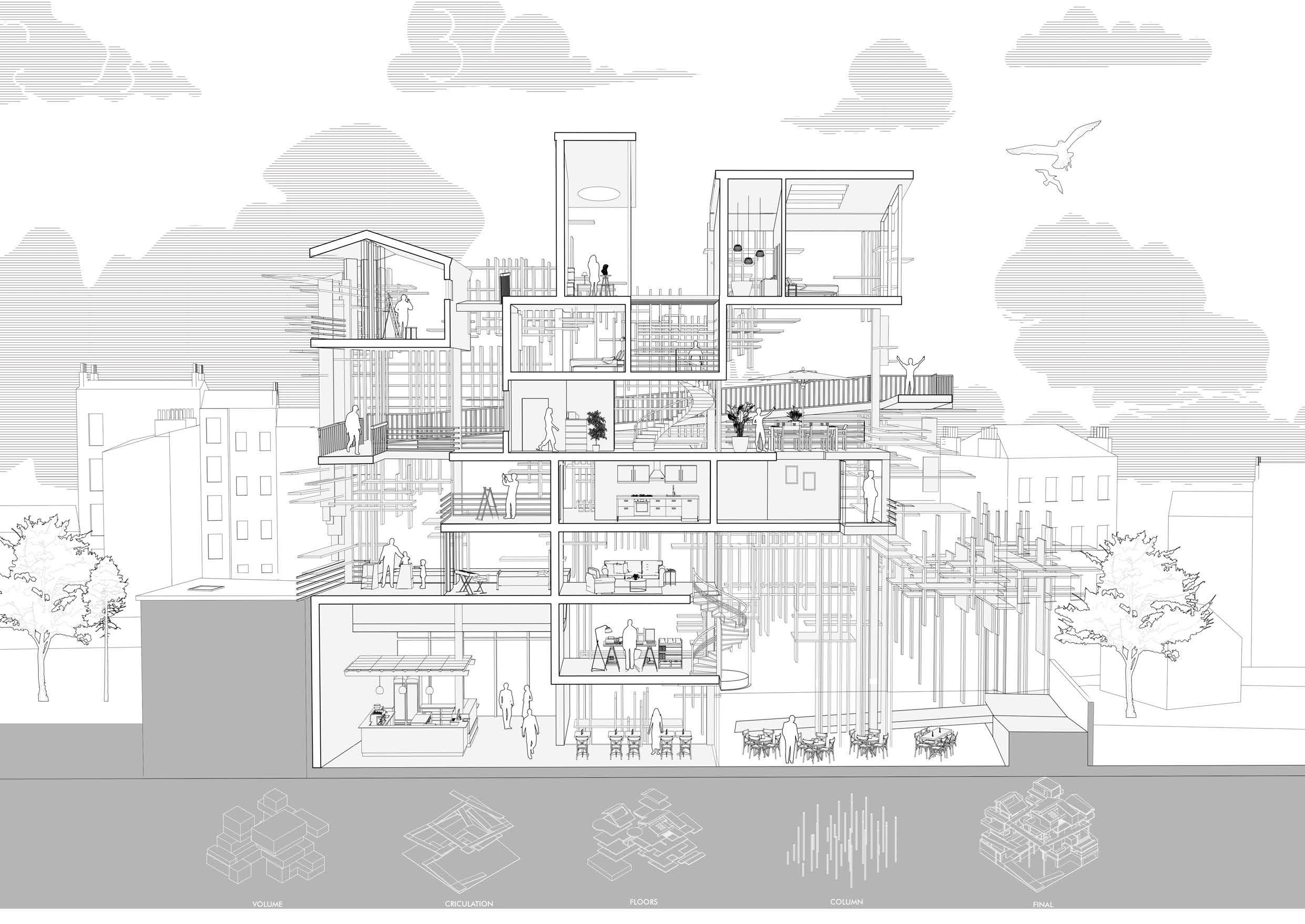
TOGETHER 9 VOLUME CRICULATION FLOORS COLUMN FINAL
LIVING
relationships between the residents and the visitor, the neighbourhood, and nature It corporate many passive design strategies such as flexible light shutters to facilitate ventilation shading in summer and diffuse light shelf for winter.





10 INTERACTIVE FACADE DESIGN
Facade as Cave (Entrance)
Facade as Skin (Interior)
Facade as Tunnel (Exterior)
Upper Studio
Ramply Passageway
Providing shading and privacy protection to the residents
Passive design, Shading and light shelf
As baluster for residents to enjoy views
A practical seating area creates connections to street
The pubic level where encounters happed in the neighbourhoods
Providing shading and privacy protection to the residents
Terrace Street Cafe
Balcony Countyard Seat
physical model depicts the atmosphere of the wood grating facade and captures the special moments.






11 11
Terrace
Criculation Ramp & Balcony
Back Silhouette (Shadow)
INTERACTIVE FACADE DESIGN
The Top Floor Street Sitting Spot Laser Cutting & Handmade Model
The
ARCADE KINDERGARTEN


# 2 ARCHITECTURE OF CULTURAL INHERITANCE



Research work / Summer
2021
Individual Work

Location:Guangzhou, China
Supervisor : Dr Nikolia Kartalou n.kartalou@ed.ac.uk for research
Inspired by my architecture blogging and summer internship with Atelier CNS, a Guangzhou-based architecture firm famous for renovating Yongqing Fang (a traditional arcade street community) I initiate this arcade kindergarten project, aiming to unpack the renovation of unique arcade streets in an educational proposal, which aims to restore the missing link between children and local architecture, through a
that proposed the

and wisdom of traditional housing.
A HISTORY JOURNEY OF GUANGZHOU'S ARCADE STREET

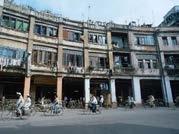

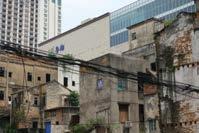





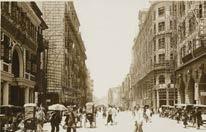
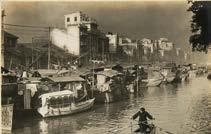
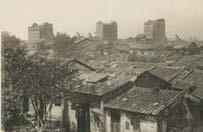
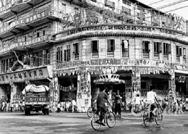

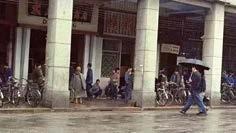
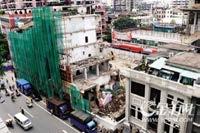
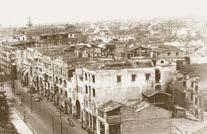

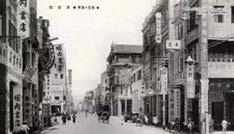
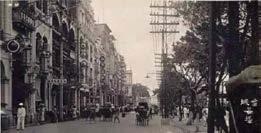

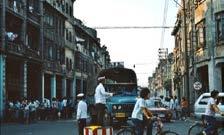

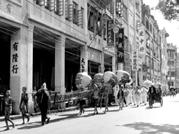



VERNACULAR CANTONESES HOUSING DEVELOPED PROCESS
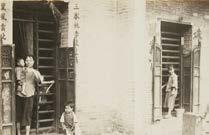

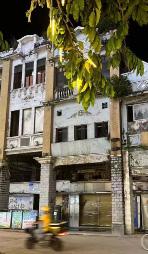


Cantonese arcades are such an interesting case that in fact summarise the intricate urban renewal process of vernacular Cantonese architecture in the last two hundred years, from Saikuan Mansion to ZhuTong house etc. it is a valuable miniature that represents Guangzhou‘s urban history: to opening as a trading port, industrialization, urbanization… yet all of those are disappearing

12
SaiKwan Mansion
ZhuTong (bamboo) House Arcade
series of tangible designs
beauty
1980 Now 1960 1930 1920 Late 1800s
After WWII, the development of arcade streets become slow, yet a growing number of citizens squeezed into the ready-built arcade. Big hotels and deportment stores also start to merge into arcade street.
Now after more and more modernise shopping malls built, arcade street is not the commercial centre of Guangzhou anymore. A large amount of arcade street has been abandoned and many illegal additions happing on the arcade street.
In 1930 arcade street went into the most prosperous period. Many famous shops and restuarant are located on arcade street and that street also become the grandest area of the city, they are the commercial centre.
Since the urbanisation progression in the late 80s, many arcade streets had been dismantled and the residential program of arcades start to fade away. Most people move to modern apartments. But the commercial program on the ground floor still dominated.
Compress lack of land since urbanization Stack increase of city density
RESEARCH
In 1918, the Guangzhou government enact a “ Canton building prohibition regulations and implementation details” arcade street started to become popular in Guangzhou.
BACKGROUND
ARCADE QUESTIONNAIRE RESULTS
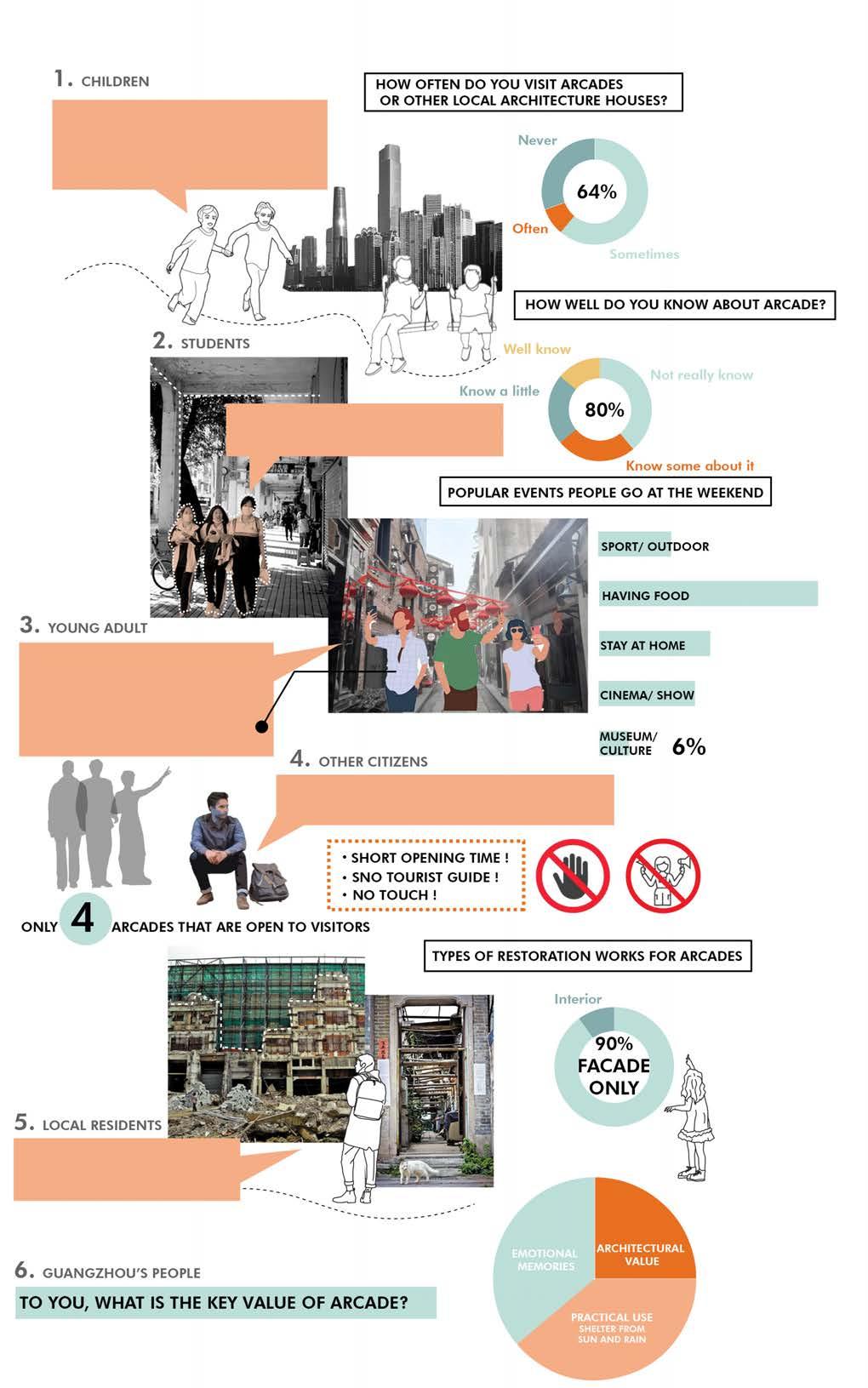
Most of my family and my friends are living in a high-rise apartment, so we got a few chances to visit the arcade
We see the arcade every day, but we don’t know why it is important ?
The renovation distinct is all about commercial! People just took pretty selfies and post pictures on social media rather than looking at the architecture.
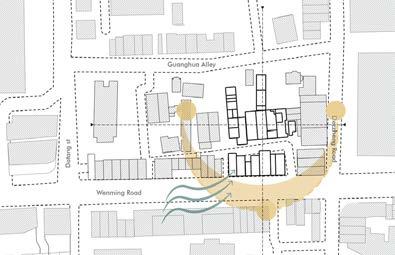
I am interested in Guangzhou’s architecture but there is no place offering a proper introduction.


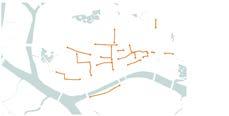

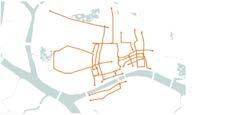

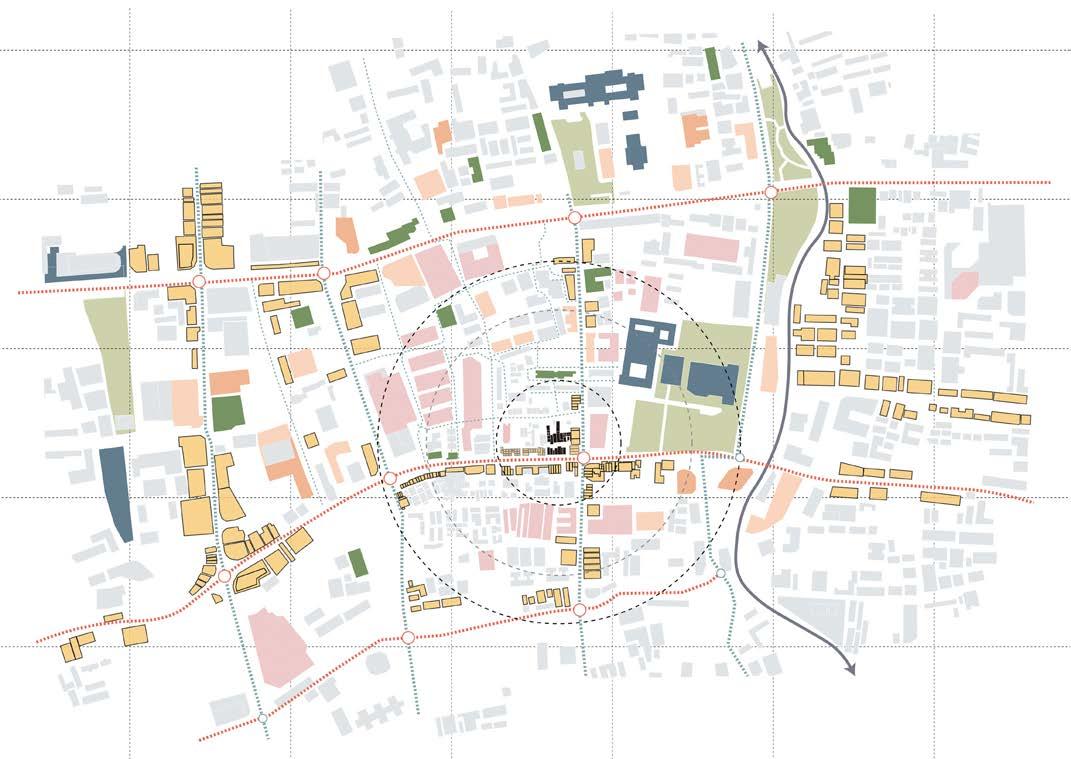

13
THE TOTAL AMOUNTS CHANGE OF ARCADE STREET
Many arcade streets are short in maintenance and conservation work
Back Conor
Dense Back Alley
Traditional House
Back Ally: Gable Roofs Alley Entrance
Shabby Facade
Public Facility PROGRAM 1910 China Guangdong Guangzhou(Canton) 1930 1980 2010 Residential ArcadeCommercial
Broken Windows
SITE CONDITION
Shops are closed
SaiKwan Mansion

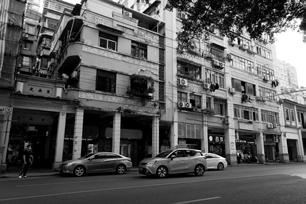
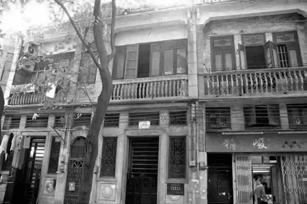
• Privacy Gradient • Private Courtyard • Halls




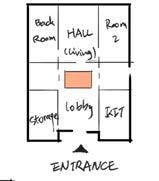
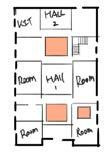
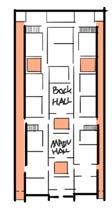


Current Condition

Lack
Traditional Elements Extraction



However, the traditional housing has many valuable vernacular designs, such as spatial relationships and ventilation strategies that should be preserved and populated for the young generation.


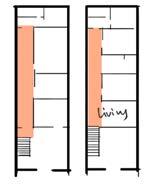
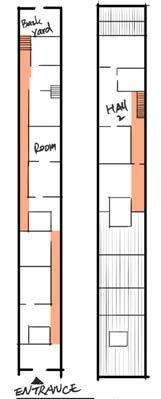




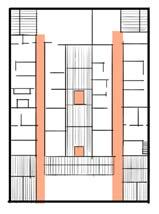
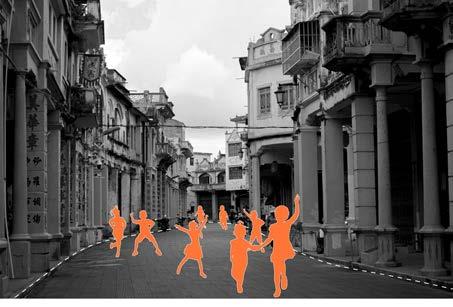
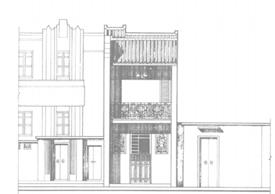
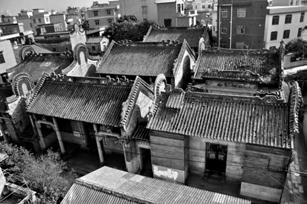
Possible Future




Experiencing

14 Guangzhou Vernacular Houses Development Timeline Layout Spatial Sequences
RESEARCH Elevation Façade width Section Ventilation Strategies Hall pubic Hall family Room Countyard 1 Countyard 1 Countyard 2 Countyard 2Patio Patio Countyard 3Backyard 4 Entrance Before 1850 1890 1930
INTROSPECTION TYPOLOGY
traditional spacial relationship Getting close to vernacular material Play with natureServing the community at weekend
Therefore, my design goal is to restore this missing link between children and local architecture, through many tangible designs that proposed the beauty and wisdom of traditional housing, Such as the delicacy of Cantonese stained glass windows and the wind pressures ventilation strategy by using a combination of the cold ally, courtyard and high roofing. of Conservation Education Deficiency Outdated Features
Central
• Side Criculation • Front shop, back housing • Ventilation Control Arcade 1 2 3
X Education Design Srategies Kindergarten ZhuTong (bamboo) House
The fast-paced development demolished many arcade streets and traditional houses and expelled people to newly built high-rise apartments which cause many new generations to be disconnected from the indigenous architectural context.
and
axis
Arcade
16
19 11 10
Recreate 6 5 2
Axle Clear 3


13. Kitchen
14. Classroom 1 (4 years old)

18 14 9 7
17
Rejoin Continuous Roof Terrace 1 4
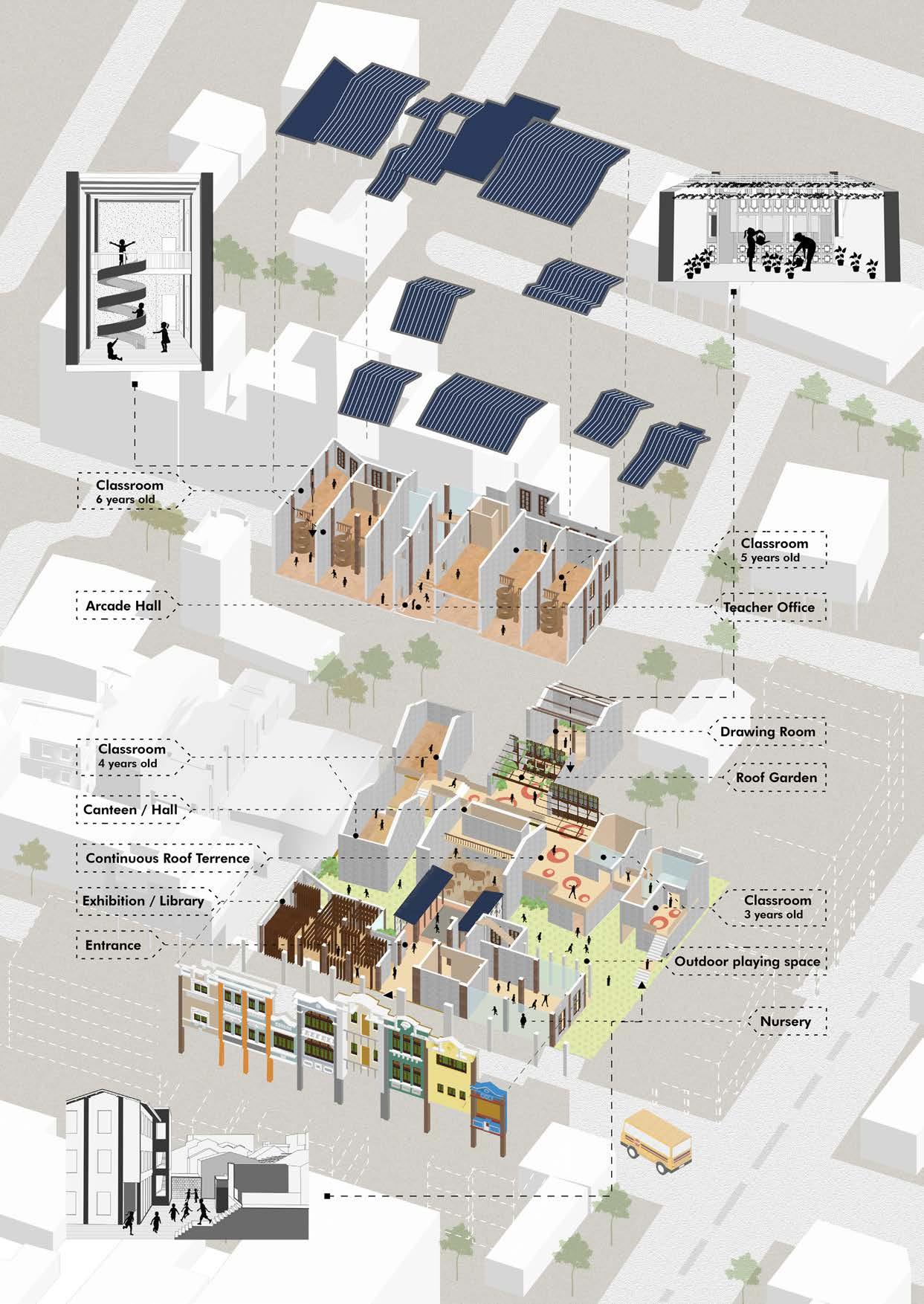
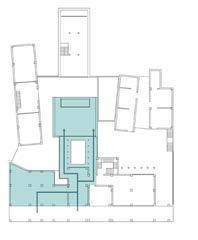


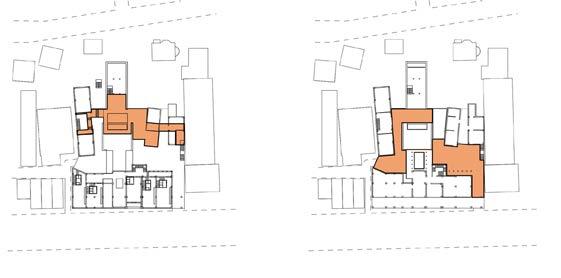



Programming 12
15
Cold Allies 8
Playing on Traditional Street Scale
the Back Ally 1 5 2 6 3 7 4 8
the Central
out the
Ventilation
The kindergarten will have 8 classrooms and serves 120 kids between 3- 6 years old. The kindergarten Hall will also open to the pubic at the weekend to hold culture-promoting events. Circulation Outdoor Activities Space Weekend PublicStudent
15. Classroom 2 (4 years old)
16. Courtyard
17. Multipurpose room 1
18. Classroom 3 (5 years old)
19. Multipurpose room 2
1. Entrance hall
2. Exhibition and Library
3. Reading space
4. Reception/ Safeguard room
5. Stair hall
6. Nursery room ( 2-3 years old)
7. Outdoor playing space (Eastwing)
8. Water play area
9. Outdoor playing space (Westwing)
10. Nap room
11. Canteen hall
Courtyard Spatial Sequences
12. Storage
13
DEVELOP PROCESS
Weekday
The central axis is designed to represent the important spatial sequence in Linnan housing. The kids can freely walk through the building and have close look at the materials and forms.
Moving through the classroom
Planting on Wooden Roof
15
ELEMENTS REPRESENTATION

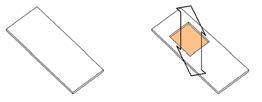

THE ROOF & SKYLIGHT
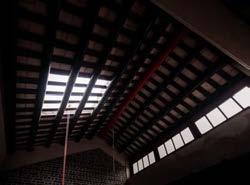
Adding back the skylight restore the missed spatial sequence from SaiKwan Mansion to the arcade, the curving floor also mincing the roof shape which gives the kid a close chance to feel the roof and it also negotiates the height difference on different arcade blocks.







THE HALL & BRICK

The hall is the spacial core of SaiKwan Mansion where the most important meeting or events happened and is the symbol of the whole family. By recreating the traditional axis, the hall becomes the centre hall of the kindergarten and the centre of a family. At the weekend, the hall will also be open to the community for holding events. Also, the hall provides touching experiences on blue brick, the vernacular building material in the Lingnan district, which give a delicate texture to the wall.

the Blue Brick
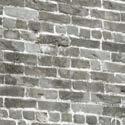
THE WINDOW & PROJECTION

Cantonese stained glass windows are a key feature in Lingnan residential which is a fusion interesting meanings on it. For example, I choose the “eight crossing four”, the most common understanding of the window while providing a chance for kids to create the composition they
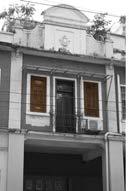
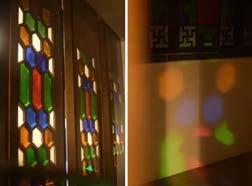

16
Class Mode Grid Centre Base Grid Heart Frame
Courtyard
Original Open Up Connecting Function Courtyard Ventilation path Ventilation path Typical arcade facade with Cantonese stained glass window Hall
Touching
Multipurpose Room Main Hall Arcade Hall
The Hall in SaiKwan Mansion
product of western and eastern cultures. The composition of the window pattern also has common composition, pattern to develop a set of tables and chairs to enhance the children's they like. Those tables are highly feasible for various educational proposals.

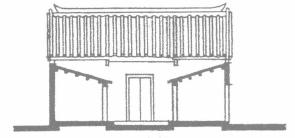

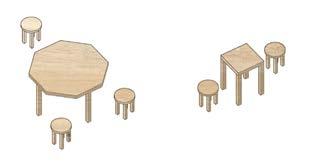
THE

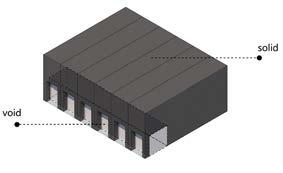
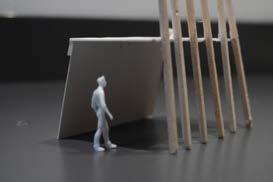

Located in the Subtropics area, rain and storm are important elements in Cantonese daily life. Also, The sunken rain courtyard, in the traditional SaiKwan Mansion, has significant Fengshui means: protecting family properties. Therefore, this water park area in the courtyard satisfies the inheritance of culture and children’s playing needs. A wind wall is added to the corridor to maintain spacial penetration and enhance children's sensational experiences with rain and wind.

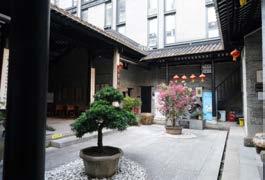




THE ARCADE CORRIDOR & SHADOW
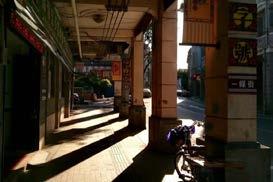
The shadow created by the colonnade is the most famous image of the arcade. I design a series of bookshelves to represent the atmosphere while fulfilling practical use. This created an exhibition/ cultural library for the pubic to get a close look to the arcade and promote local culture.
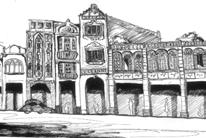




17 Small Group Mode Individual Mode
RAIN & WIND
Projection effect in Classroom
Sunken rain courtyard
Rain dripping from the eaves Diagram of rain dripping and wind wall
Shadow on arcade street
Interactive exhibition library Rain Courtyard Classroom
Contrast of solid and Void of Arcade Repetitive frame and openings Final Form
Concept Model on the shadow effectSketch of the Atmosphere
Wind wall structure Traditional rain courtyard
Climate change has been a hot debate throughout recent years, yet most people did not realise how much emission their house produces. It is urgent to raise public awareness on improving building performance in order to reach the zero-emission goal in 2050 which can also help us to achieve thermal comfort in a sustainable way.




THERMAL ORCHID HOUSE #
3 ARCHITECTURE OF PUBLIC PERCEPTION/ SUSTAINABILITY
Technology and Environment: Principles course work / Second Year

2021
Individual Work Location:Edinburgh


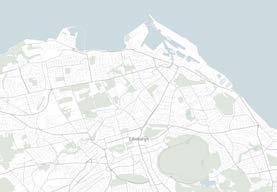

Supervisor: Elaine Pieczonka elaine.pieczonka@ed.ac.uk
Starting by reflecting on the 26th Climate Change Conference (COP26) in Glasgow in 2021, this course and project are mainly focused on environmental building science and ask us to take action in reaching the zero-emission goal in 2050 for Scotland. The project aims to arouse people's awareness of building energy performance and reach a good score on the Standard Assessment Procedure (SAP).
TO REFUCE EMISSIONS, WE NEED TO...
WHERE WE ARE ?
Latitude:
In regard to Edinburgh’s situation, heating is one of biggest the emission sources from housing, therefore, the idea of applying passive strategies to achieving heat balancing without electrical heating is critical to populated.

18
The UK• Scotland • Edinburgh
•
SITE CONDITION EDINBURGH
W Range of Temperature Underheated 58% Overheated 17% Modreate 25% Determine Monthly Comfort Temperatures
55.57 N Longitude: 03.21
WHAT‘S
?
HAPPENING
Site Condition
PRECEDENT ITERATIONS

Based on the research on local climate and precedents, I decided to use orchids, which have similar environmental needs to humans, as a medium to visualize and perceptualize the power of passive design to the public. My goal is to design a thermal orchid house where both orchids and humans can flourish without electrical heating.

Solar Decathlon-Orchid House


Architect: Unicode Team

Location: Chateau de Versailles, France
COMPARISON OF PREFERABLE CONDITION DESIGN STRATEGIES



DEISGN
I consider some key aspects of energy loss, such as the form factor and orientation. I also aim to maximise solar gain by employing thermal mass to preserve heat for cool nights. What’s more, the Orchids need to avoid direct sunlight therefore, promising enough diffuse light is crucial. A couple of forms and compositions have also been tested to out to achieve the best heat balances score.



FACTOR
LIGHT & VENTILATION THERMAL MASS WATER LOCAL MATERIAL
HEAT LOSS SOLAR HEAT GAIN
FORM
DIFFUSE
REDUCING
Structure testing model
GOAL
Design Concept Sketch
19
WHAT CAN WE DO ?
MAIN STRUCTURE WALLS


LOW-E
The whole housing and the insulated wall is been carefully oriented to protect from prevailing southwest wind. The idea of Trombe Walls applied to maximise the use of solar gain while protecting orchid from direct sunlight. A thermal massing water base is employed to adjust the indoor humidity and have a warmer ground which matches the fact that human beings tend to feel comfortable with warm feet and cool heads.






Cool Head
Warm Feet

20
STRUCTURE
GLAZING FOUNDATION ROOF
THERMAL MASS NIGHT SUNLIGHT WINTER SUNLIGHT SUMMER NATURE VENTILATION
20
PASSIVE STRATEGIES
ASSEMBLY & U-VAULE CALCULATION



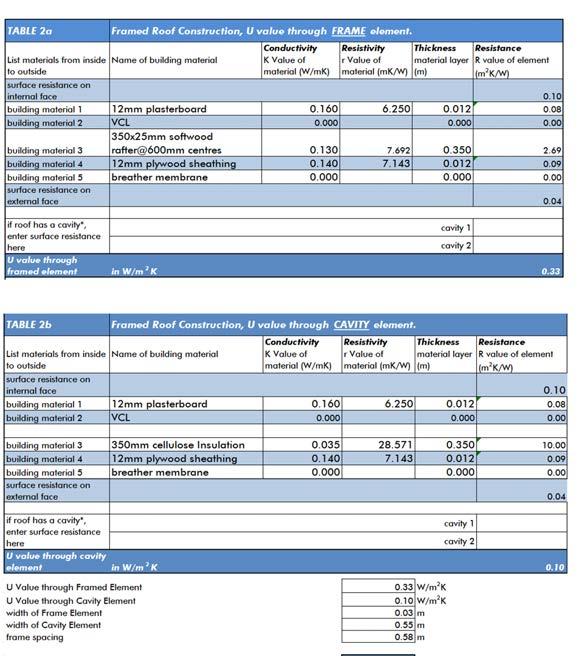
1. ROOF AND SKYLIGHT
Rain Gutter
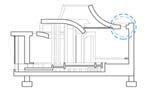
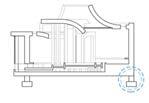
AIRTIGHTNESS



Polyethene vapour barrier and breather membrane both continue from wall to roof to prevent any possible damage of condensation and achieve airtightness

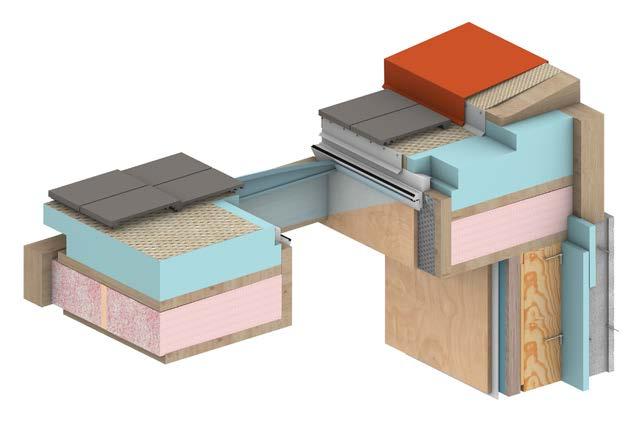
2. FOUNDATION AND WALL


AVOIDING COLD BRIDGE
Strip of perimeter insulation around the slab and any screed with thermal resistance to prevent any cold bridge Also, the damp-proof membrane goes above the concrete slab and connects to DPC.
21
Polyethene vapour barrier
Thermalblock
Breather Membrane
BUILDING PERFORMANCE CALCULATION





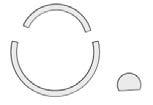




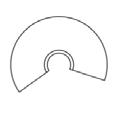

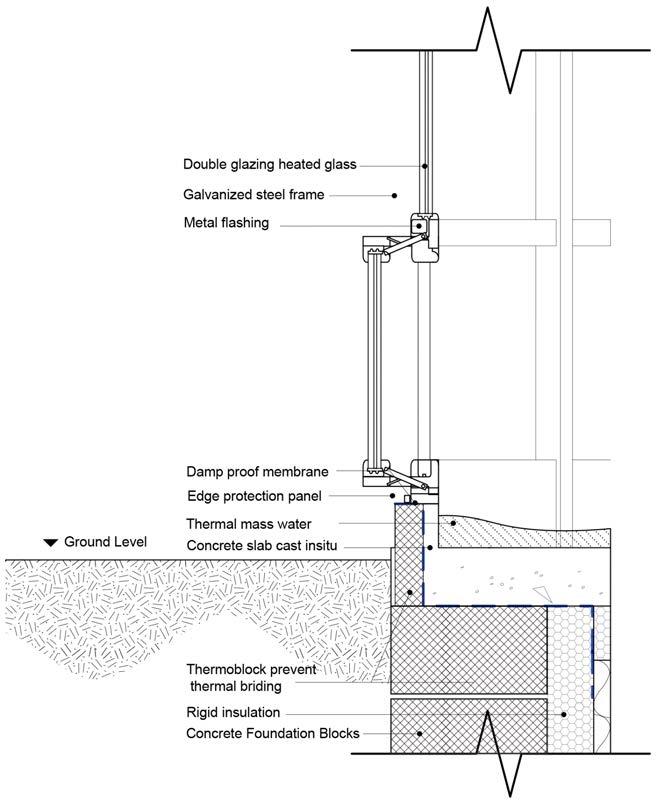
The orchid house has great thermal performance with U-value on Wall at 0.13W/m^2K and on the Roof at 0.11W/m^2K and achieves positive heat balance throughout the whole year. With all this help, it scores a great energy efficiency rate of 86 on SAP.


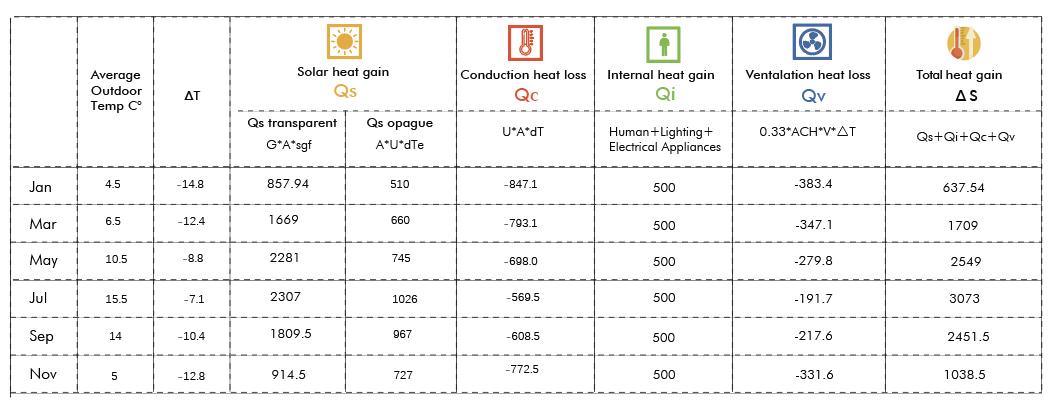
The average daylight factor of the skylight indicates a suitable amount of diffuse light that is preferable for orchids living.

22 DAY LIGHT FACTOR
AVERAGE YEAR HEAT BALANCE CALCULATION 3. WINDOW • Floor • Roof • Glazing • Wall AREA AVERAGE DAYLIGHT FACTOR DFavg % =t* W* * M A*(1-p^2)
LINES IN THE LANDSCAPE #

4
ARCHITECTURE OF SYMBIOSIS

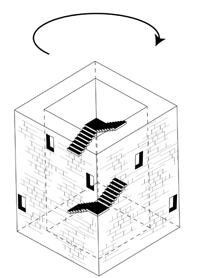


Architectural Design: Explorations Course



Work / Third Year 2022
In progress Group Work (Diagram or Drawing that has * in the caption means I am partially involved)
Location:Culross, Edinburgh
Supervisor: Andrea Faed
a.faed@ed.ac.uk
''With hedgerows as a starting point, design a place that accommodates and includes a ‘Community Food Store’ that addresses the scenic qualities of its landscape, along with ecological, wildlife, and nature issues. Propositions responding to the challenges of the environmental crisis and to the form of the hedgerow should result in exciting pieces of architecture presented in a manner that meets the themes on nature.''







Hedgrow:
''A Man-made living fence, constituting of densely planted hedge plants, creating a border and line in the landscape''

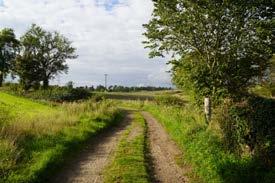

After a site visit, a serious comprehensive analysis of long elevation species layering, human intervention etc. was conducted. With hedgerows as a starting point, design a place that accommodates and includes a ‘Community Food Store’ that addresses the scenic qualities of its landscape, along with ecological, wildlife, and nature issues.
Culross
PRECEDENT STUDY




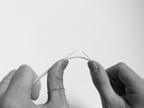

23
Hedgrows Site Photos
1640s Tofu
2018
Hedgrows Site Short Section 2019
Coxton Tower Unknown Elgin,Scotland, UK
Factory Tian Tian Xu (DnA Architect) Lishui, China
Rice
Wine Factory Tian Tian Xu (DnA Architect) Lishui, China
Linear Programming Layering Enclosure Level
Site Plan
Cutting Hedgrows Imitation Model
*Site Sketch
HEDGROWS STUDY
POROSITY- LAYERINGS



As hedgerows consists of the different appearance in their branches and leaves produce the effect of varying density through layering and interweaving to one another.





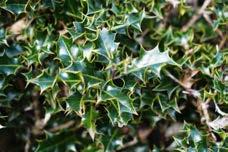
Elevational Analysis



Hedgerows as Facade System

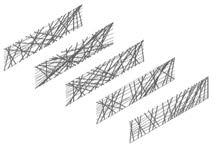






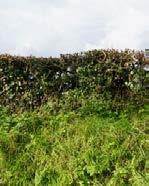


HUMAN-MADE LANDSCAPE LINE BIODIVERSITY


Human-cutted

Taking a closer look it came to a conclusion that the straight and flat line of hedgerows derived from the action of ‘man-made’ cuts.




As hedgerows are a linear and continuous plant that consists of various species,a strong sense of promotes symbiosis enables the continuation of life cycle in hedgerows.





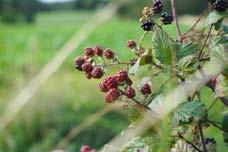

Species Analysis
Fruit and Leaves
24
Site Elevation SITE OBSERVATION Right after cut 01 02 03 Trunk CoppicingPollarding LayingBraiding Inosculating Branch Few weeks later A Month later Few Months later CUTTING HEDGROWS Recover Timeline TRIMMING HEDGROWS
Cutting Techniques Shaping Leaves
Hedgrows
Hedgrows
Hedgrows Layers
Root
Element 1: Horizontal Lines in Landscape






Inspired by the linear landscape of Culross (especially the cutting hedgerows), we developed our plan in a linear sequence to depict the rhythm of the scene.
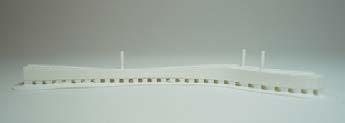









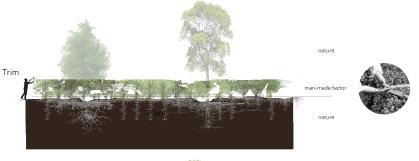
Also, this linear relationship corresponds with the food production lines. Therefore, we arrange our building along with the linear relation in multiple ways.


Element 2: Navigation & Transparency

Having explored qualities in hedgerows such as the similar ‘line’ in hedgerows and buildings in Culross, as well as the ‘gaps’ in hedgerows similar to the openings in building elevation, the elevation variation of density with different control factor was created.
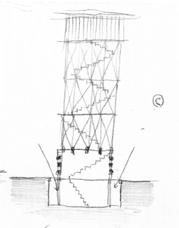


Element 3: Cut & Root/ Above and Below
We also employ this relation in our section to explore the above and below relationship of hedgerows. We put some spaces which dig underground to match the fact that food naturally grows from the ground.

25
Circulation Programme
ELEMENT DEVELOPMENT & PROPOSAL
*Site Plan (prepare line drawing)
Diagram and Sketch Pickle Production Route *Rendering Visitor Route
Sketch and Massing Model
Density Control Overlay Diagram Rooting
The pickle library is a storage tower which also offers a wonderful view of the surrounding landscape. Various pickles in different sizes of containers will be able to store on the corresponding floor. An elevated platform will be able to carry them. Also, natural ventilation has been carefully designed to work by the temperature differences.



26 PICKLE LIBRARY TOWER----BIODIVERSITY
*Pickle Library Bio-Facade
Structure Isometric Drawing
It gets inspired by interdependent productive relationships from hedgerows where the inner layer is the food bank for humans and the exterior skin is the food bank for animals such as birds.
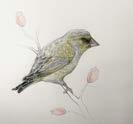
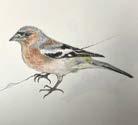
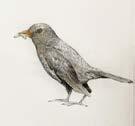

The green facade of the tower has its own small ecosystem. Different plants or crops planted on the different floors create different micro-climate which repondoes to the diverse living needs of species. Also, the planting pot has a rainwater collecting and irrigating system to achieve sustainability.



PICKLE LIBRARY TOWER----BIODIVERSITY
Blackbird Green nch Cha nch
Biodiversity & Life Cycle
Tower Section
Food Bank for Human
Food Bank for Animal
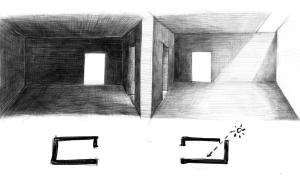





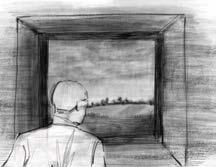







28
MOMENTS
*Community Allotments
*Inhabited Wall/ Corridor
Pickle Library Model
*Inhabited Wall/ Windor
*For all renderings, I took the job of making the original Rhino model
*Elevation
*Isometric Overview
*Fermentation Room
PEIYAO FENG
SELECTED WORK 2020-2022
you for your considering.
#
Thank
PORTFOLIO
MARCH ARCHITECTURE





















































































































































































































































































































































